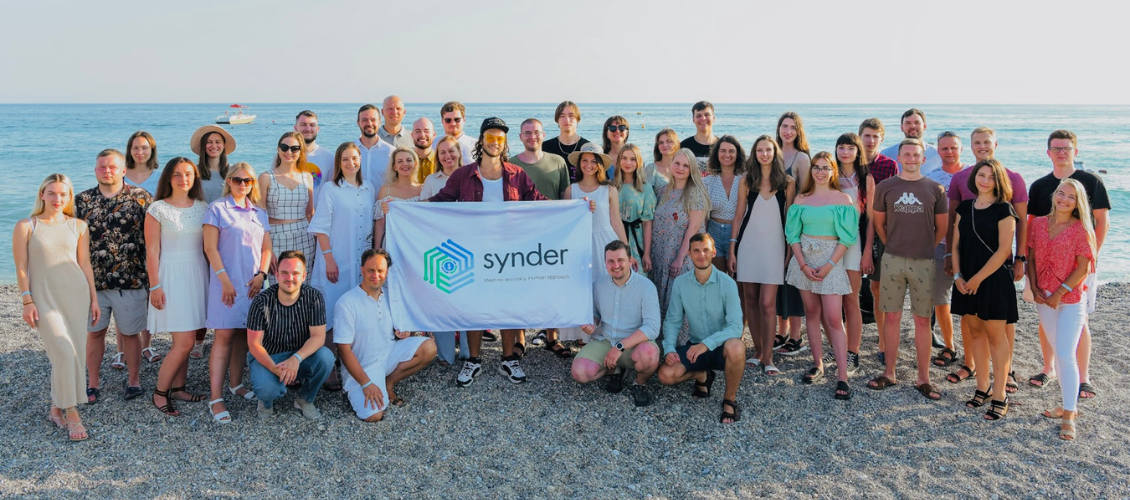Startup of the Week: Synder
2021
Sep 30
Sep 30

We are excited to introduce you to this week’s Startup Of The Week – Synder. The startup bills itself as an easy accounting platform for e-commerce businesses.
With a help of the Startup Visa Lithuania program, this Belarusian startup came and opened an office in Lithuania in September 2020, and founders with part of the team working from here.
Let’s read their story and find out how they took the advantage of the pandemic and managed to grow their team internationally. ⤵️
Tell us about your startup. What is Synder? And how does it work?
In a nutshell, Synder automates accounting for e-commerce and SaaS businesses. It collects and categorizes sales and expenses from different sources into one ecosystem. And what makes it amazing is that Synder does everything literally by itself, no need for manual work. It’s just perfect for business owners who don’t want to care much about hand-entering data into books. We help them track their sales on a daily basis, smartly analyze their activity, and ultimately make better decisions.
What are your competitive advantages that work? What are your competitors?
There are a few accounting apps on the market, but they are very difficult to use and are not adapted to the needs of online businesses. This is our competitive advantage! We created Synder especially for e-commerce business owners who need to get essential sales data automatically. We always try walking in our users’ shoes and look at problems from their perspective. We understand that they just want to get accurate business data with a minimum of costs, time, and accounting skills required for this important part of their business. And that’s where Synder comes in handy!
Luckily, we live in the Information Age when modern technologies allow us to make any idea come true. You can find the right solution and solve the most boring and time-consuming tasks easily, effortlessly, and even entertaining. This is the backbone of Synder – easy and fun accounting.
What were the reasons behind coming up with this idea and launching this product? When exactly did you launch, what were the main challenges before launching?
Our journey takes its roots in 2016 when we founded CloudBusiness. At that time, our team was developing several online services that cover some narrow bookkeeping tasks for accountants in the United States. All of those solutions accepted payments from customers via Stripe and PayPal. At that moment we faced the problem of how to account for such online payments in our books. We realized that if it was a pain for us, it might be a problem for other businesses too. So in 2019, we released a new product – Synder!
The launch of Synder was really a timely decision. In 2020, the Covid-19 happened and so many offline businesses had to go online to survive the crisis. Even hairdressers had to learn how to sell their services and online courses through the web, to start accepting payments online, and keep track of them. Synder could make this offline-to-online transition easier and faster for businesses. In addition to payment providers like Stripe, Square, PayPal that we already supported, we integrated many e-commerce platforms such as Amazon, eBay, Shopify, BigCommerce, and others. So our users could fully automate accounting for their online sales and get valid data from multiple channels at the same time. This opened many opportunities for our startup. So we weighed the pros and cons and decided to invest all our financial and human resources into Synder.
What are your target customers? Both in terms of user profile and geography? Do you have some already?
Every company has its sweet spot in terms of target customers and Synder is not an exception here. We are targeting the US businesses as there are more than 30M SMBs out there. Inevitably the vast majority of them are going to start selling online as the numbers show that the online sales sector is skyrocketing and it isn’t just a trend, it’s our new reality. We want to be on the cutting edge of this process. However, as the e-commerce sphere is growing globally, we also pay much attention to the UK and EU markets where merchants have the same pain points that can be effectively covered with our solution! So, if you are selling or you are going to sell online, we definitely invite you to try Synder.
Also, it’s worth mentioning that Synder perfectly works for SaaS companies. They have to manage and account for their subscriptions that are coming through different payment methods like Stripe or PayPal. It was the problem that we solved for ourselves when we started accepting online subscriptions. It’s so important to track your cash flow and know how much you get from different channels on a daily (or even hourly) basis. Now you can do it literally in one click and this is what we love about Synder. Together with that, businesses will have their accounting done just automatically – a try relief when you have to focus on building your product, not doing paperwork.
What are the biggest challenges while working on this product and how are you overcoming it?
It is not enough to make just useful software. It is important to make a product that users want to get as soon as possible! We understand that it doesn’t matter how helpful our product is if people do not know about it. This is the biggest challenge that we are trying to overcome! We are constantly expanding the software functionality to close more and more requests of online businesses. At the same time, we are looking for new distribution channels.
Tell us more about funding. How did you get it? Do you seek extra funding?
In May we raised $2 million from the TMT Investments venture fund. The whole process from the first meeting till getting the investments took us about 2 months. This is a super short time frame! We couldn’t have expected it. We think our cooperation with TMT Investments is a very successful case. Our investors not only support us financially but also help us with useful recommendations. They really understand the core idea of our product and do their best to help us make scalable growth.
Also, this summer our team was chosen for participation in the Y Combinator S21 batch. Our startup was selected among 16,000 applications, and only 388 of them were invited to the incubator. The culmination of our path in YC was the demo day – a time when the participants present their products to more than 1,500 investors and journalists. We carefully prepared for our pitch, since you had only 1 minute and 1 slide to tell about Synder. Participation in YC is already bearing fruit as every day we are getting a lot of messages from investors and the media.
Please introduce your team!
There are about 60 employees in our team, who work in our offices in Minsk, Vilnius, and San Francisco. Like many other companies, the pandemic taught us how to work online as effectively as offline, so employees from Russia, New Zealand, Poland, and other countries were also able to join the team. At the very beginning, there were just a few developers with great enthusiasm and desire to create a perfect accounting tool. But over the past 2 years, we have expanded our team and formed 3 more departments: Customer Success, Marketing, and Sales.

Strong startup culture isn’t something that can be created overnight but it can be worked towards with some conscious moves. So what are your moves towards this?
Even though Synder is a startup, we’ve already formed some key points of our corporate culture. Our motto from the very beginning was “Machine Accuracy. Human Approach”. We are doing accounting and analytics and we are always precise and honest with the numbers that we are operating with. It makes us do our job without any compromises or self-deception. Numbers talk! And this accuracy in how we treat those numbers drives our strategy further on. Everyone strives to get amazing, positively shocking results! At the same time, we are trying to keep a horizontal hierarchy in our company’s communication, so every member of our team can easily talk to us or the heads of their teams about any professional or personal concerns they have. Our goal here is to make every team member feel and understand that they are a critical aspect of Synder’s growth. We also make a lot of effort to be transparent with every single teammate, customer, or partner. We run weekly meetings with the whole team when we share the results and future goals. It’s much easier to scale a startup when everyone sees our product in dynamics, targets, and roadmap and of course when everyone knows our customers and their needs.
⭐️ Bonus question: what’s next? Tell us about your future plans.
For the nearest future, our main goal is to get more distribution channels. We want every online business in the United States, at least, to know about Synder, and better – actively use it. Also, we are doing our best to expand the functionality of the program and help more and more businesses globally. But it’s important that we don’t want to make the software complicated for customers. We check the “ease and fun” of Synder at each step of the development to create software that people love to use.
We are happy to have you here, Synder, and thanks for sharing your story!
